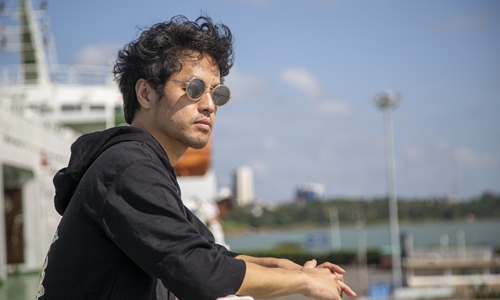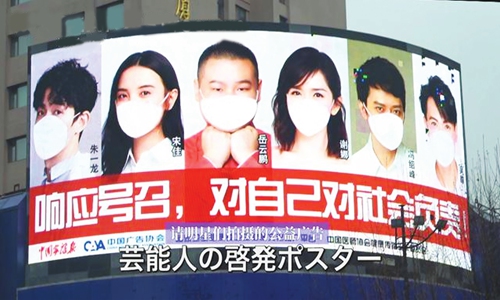Japanese director making China’s post-epidemic documentary wants to visit Wuhan
By Xing Xiaojing and Shan Jie Source:Global Times Published: 2020/4/16 20:03:41

Takeuchi Ryo Photo: Courtesy of Takeuchi Ryo
Japanese director Takeuchi Ryo's schedule is full recently.
After his first documentary about the COVID-19 battle in Nanjing, East China's Jiangsu Province, where he lives, dozens of newspapers and television networks from Japan and China have been reaching out to him for interviews.
The documentary, Nanjing's Anti-epidemic Scene, was viewed more than 10 million times within the first 24 hours it was uploaded online in early March.
Recently, Takeuchi published a second episode about how Nanjing is reviving after the virus outbreak. Once again, this documentary went viral in Japan.
From a view of a resident in Nanjing, Takeuchi has not only recorded what really happened in the city during COVID-19 outbreak, but introduced China's measures on tackling the epidemic.
"I also saw some reports smearing or lying about China. I hope media and people from other countries could see China's efforts in preventing the epidemic from an objective perspective," he said "This is my biggest desire as a documentary director."
At the scene
Bustling and crowded streets are one reflection of Nanjing's victory over the COVID-19 epidemic.
Roughly a month ago, Takeuchi also shot the city's streets, where only one car was driving on road. At that time, most people were quarantined at home in Nanjing.
To show how the city had survived, in the second episode, Takeuchi visited a hospital that treated more than 90 COVID-19 patients - the Nanjing Public Health Medical Center. The hospital was built with the lessons learned from the SARS outbreak. In the past two months, all the COVID-19 cases in Nanjing were sent here and healed.
In his documentary, Takeuchi showed the remaining signs from the battle against virus - posters telling doctors and nurses how to protect themselves, robots that send medicine and the empty sickrooms.
Takeuchi also shot a local Wal-Mart full of customers. The manager told Takeuchi that during the epidemic, the market received up to 100 online orders every day.
With the blossom of sakura as the background, Takeuchi said in the end of the documentary that "Everybody's life was impacted by the epidemic. But at least now people in Nanjing could bear the feeling of safety."

A screenshot of Takeuchi Ryo's documentary on Nanjing's anti-epidemic stories
Show the effortsAfter the second episode of his documentary, Takeuchi heard that his name has been trending on Twitter in Japan. Many people said that they are "jealous of Nanjing people," and the documentary is "more objective than television networks in Japan" and some even suggested it should be showed to Prime Minister Shinzo Abe.
In an interview with the Global Times, Takeuchi said his original intention of making the documentaries was because of Japanese people's lack of awareness about COVID-19. When the situation was getting severe, the Japanese government's loose measures and many people's weak awareness made him worried, he shared. "Especially when China managed to control the epidemic, some Japanese people therefore thought the situation seemed not very serious." "But they do not understand how much effort the Chinese people have exhausted to achieve this," Takeuchi said.
He said his own understanding about China's quarantine measures was also deepened through his experience.
In mid-February, after returning from Japan, Takeuchi was requested to be isolated at home together with his whole family.
At first, he did not understand the necessity of the quarantine. But the detailed work of community workers, as well as many changes in the society, prompted his respect.
As the documentary series received great attention in China and Japan, television networks from more than 10 countries, such as Russia, Italy and South Korea, have reached out to him, hoping to broadcast his documentary.
On April 3, Takeuchi and his Chinese wife Zhao Ping attended a ceremony, in which they donated the material about the Nanjing's anti-epidemic scene to the Nanjing Archives Bureau as a persisting memory of the city.
Takeuchi is preparing to shoot more of China's anti-virus stories. He even plans to go to Wuhan, Central China's Hubei Province, the city that fought the worst of the epidemic in China.
"If the documentaries are needed and could be referred to, I will shoot more," he told the Global Times.
The friendly reason
Takeuchi implied that because of the epidemic, his company also bore great losses. However, during the battle against the virus, he saw people in China and Japan helping and supporting each other, which touched him a lot.
Before the documentaries about the COVID-19 become popular, Takeuchi has been known by many in China with his efforts to introduce stories between China and Japan.
His documentary series, The Reason I Live Here, has garnered many fans. It shows stories about Chinese living in Japan and Japanese living in China. The channel now has more than 600,000 subscribers on Bilibili, a Chinese streaming platform.
The Reason I Live Here has celebrated its four-year anniversary and has about 200 episodes. The audience has praised its down-to-earth storytelling style. Sometimes Takeuchi also makes appearances in the documentary, giving extra effort to the program. Fans love to make joke and interact with the director.
In the 100th episode, Takeuchi did a special about himself, displaying his life as a Japanese living in China.
Born in 1978, Takeuchi came to China to shoot a documentary about mahjong as he was 23. Later in 2010, he spent one year in China shooting the Yangtze River for NHK. He travelled 6,300 kilometers from Qinghai to Shanghai along the China's longest river.
Now he has been living in Nanjing for seven years with his wife, also the producer of the documentary, and their two children.
His studio is not big and he does not have much sponsorship for his work. However, Takeuchi said that he would continue the series to record people living in other countries.
Newspaper headline: Rolling on reality
Posted in: PROFILE